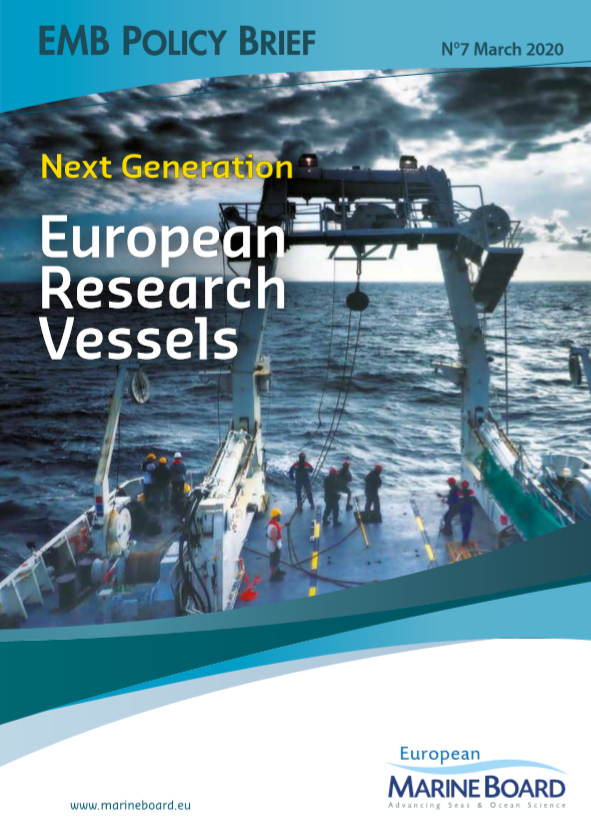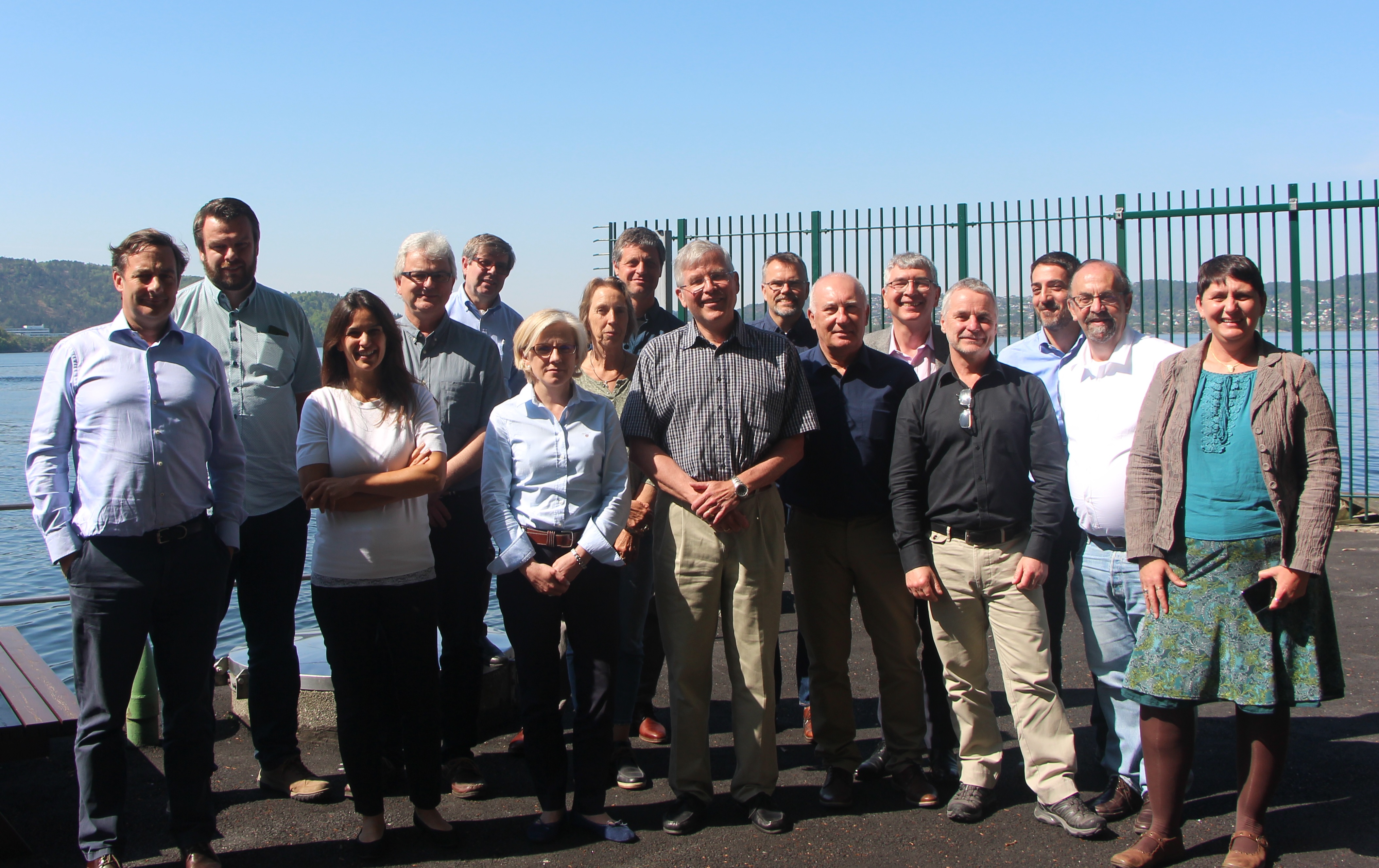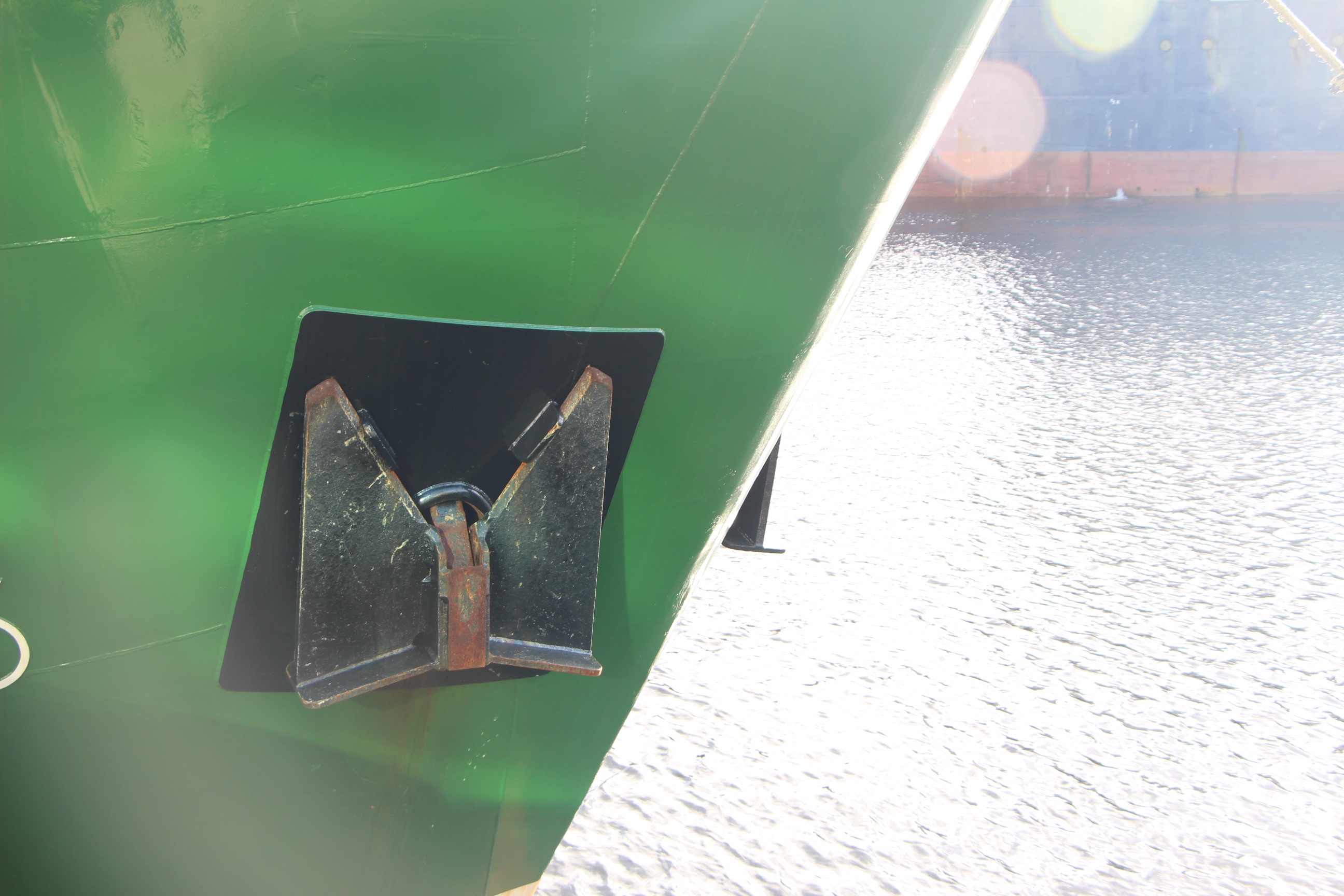Output
 Policy Brief 7, Next Generation European Research Vessels (March 2020)
Policy Brief 7, Next Generation European Research Vessels (March 2020)
News article on policy brief publication (March 2020)
Positi on Paper 25, Next Generation European Research Vessels: Current Status and Foreseeable Evolution (November 2019)
on Paper 25, Next Generation European Research Vessels: Current Status and Foreseeable Evolution (November 2019)
News article on position paper publication (November 2019)

Position Paper 10, European Ocean Research Fleets - Towards a Common Strategy and Enhaced use (March 2007)
Impact report on Next Generation European Research Vessels document (November 2021)
EMB Science Webinar on New developments in research vessel capabilities and technology (June 2022)
Respect at Sea video (July 2022)
The main messages and recommendations of PP25 and PB7 have also been featured in a number of articles including:
- How European research vessels can support a sustainable blue economy, ECO Magazine, January/February 2020 edition
- Preparing the European fleet of research vessels for the future, Hydro International, March/April 2020 edition
- Europe needs more collaboration on research vessels, Sea Technology Magazine, April 2020 edition
Background
 The EMB Working Group on Research Vessels assessed the progress made towards collaboration and interoperability, taking into account the significant technological advancements in autonomous sampling, wider technology and emerging areas of activity. It took stock of new developments and capabilities in Research Vessels and heavy equipment, and assess next generation developments and requirements for scientific research going forward.
The EMB Working Group on Research Vessels assessed the progress made towards collaboration and interoperability, taking into account the significant technological advancements in autonomous sampling, wider technology and emerging areas of activity. It took stock of new developments and capabilities in Research Vessels and heavy equipment, and assess next generation developments and requirements for scientific research going forward.
The Marine Board - ESF Position Paper 10 European Ocean Research Fleets – Towards a Common Strategy and Enhanced Use" of March 2007 included an inventory and description of the existing fleets, and recommendations on their enhanced use and management at pan-European level. At the time it was estimated that in the European Union, half of the national budgets for marine science was spent on operating and replacing marine infrastructure assets including research vessels.
Ten years on, the research landscape has evolved and there have been significant technological advancements adding new methods for autonomous sampling and observing our ocean. The European Marine Board and the European Research Vessel Operators (ERVO), decided that a new foresight activity on European Research Vessels should be initiated to produce a new foresight report, assessing the progress made towards collaboration and interoperability and taking into account the latest technology and emerging areas of activity.
At a European level, there are a number of initiatives that exist to document the European fleet (e.g. EurOcean Research Vessel infobase, Research Infrastructure Database, EUROFLEETS) and to strengthen and enhance collaboration, access and interoperability of the European Research Fleet (e.g. European Research Vessel Operators, Ocean Facilities Exchange Group (OFEG), EUROFLEETS, EUROFLEETS2). The EUROFLEETS project, funded under the Infrastructures section of the FP7 Framework, ran from 2009-2013, and was followed by EUROFLEETS2 in 2013-2017, also under the FP7 Framework. The EUROFLEETS+ project, the third in the series, kicked off in 2019. In addition, the ongoing ARICE (Arctic Research Icebreaker Consortium for Europe) Project focuses on the European polar research vessel component. It is noted however that while these projects are generally focused on particular aspects of Research Vessel design, operation and use, it was the intention of this EMB activity to conduct a comprehensive review of the subject and provide strategy and direction for Europe.
This working group provided input to the UN Decade of Ocean Science for Sustainable Development (2021-2030) societal outcomes that aim for a predicted ocean and a transparent and accessible ocean.
 Objectives
Objectives
Review the current status of European Research Vessels and related equipment;
Identify the progress made since the previous EMB Position Paper in 2007;
Assess the role of Research Vessels as part of the wider European Ocean Observing System (EOOS) and within the scope of advancing marine and ocean science research;
Explore options for future management of the fleet within Europe, exploring wider-ranging collaborations, co-ownership, chartering, training at sea opportunities etc.;
Explore options for enhancing the European Research Fleet capability as a world-class infrastructure resource for the international marine research community and finding ways to further enhance existing collaboration between projects, networks and nations to enhance access, training and interoperability opportunities, and hence cost-efficient use of these valuable resources.
In order to comprehensively cover these areas, the work was divided into 7 work packages:
- WP1 - Research Vessels as a platform and interface for ocean technologies
- WP2 - Deep Sea
- WP3 - Polar Regions
- WP4 - Training the Next Generation of Marine Professionals
- WP5 - Towards an End-to-End European Ocean Observing System (EOOS): A Research Vessel Perspective
- WP6 - Future Development of Research Vessel Fleet Management and Coordination
- WP7 - Stakeholder Interaction
Thank you to everyone who replied to our 2018 Stakeholder survey on research vessels; a summary report can be found online.
Related activities
- Eurofleets+ 2nd Project Meeting, on 3-5 March 2020, in Lisbon, Portugal
- Stakeholder workshop around EMB PP 25, on 23 January 2020, in Vigo, Spain
- Joint Open Session with EurOcean Foundation on The Future of Europe’s Research Vessel Fleet, on 6 November 2019, in Berlin, Germany
- EurOCEAN 2019 Conference, on 11-12 June 2019, in Paris, France
- European Ocean Observing System (EOOS) Conference, on 21-23 November 2018, in Brussels, Belgium
Meetings
- 15-16 May 2018, Bergen, Norway (see the news item here)
- 1 October 2018, Barcelona, Spain
- 7-8 March 2019, Galway, Ireland
Members
Chair: Per Nieuwejaar, Institute of Marine Research (IMR), Norway
Co-Chair: Valérie Mazauric, Ifremer, France
Working Group Members:
Christian Betzler, University of Hamburg, Germany
Mafalda Carapuço, Instituto Português do Mar e da Atmosfera (IMPA), Portugal
André Cattrijsse, Flanders Marine Institute (VLIZ), Belgium
Franco Coren, Istituto Nazionale di Oceanografia e di Geofisica Sperimentale (OGS), Italy
Juanjo Danobeitia, European Multidisciplinary Seafloor and Water-Column Observatory (EMSO), Italy
Colin Day, National Oceanographic Centre (NOC), UK
Aodhan Fitzgerald, Marine Institute, Ireland
Stefan Florescu, GeoEcoMar, Romania
Jose Ignacio Diaz, Spanish Institute of Oceanography (IEO), Spain
Michael Klages, Alfred Wegener Institute (AWI), Germany
Erica Koning, Netherlands Institute for the Sea (NIOZ-NMF), Netherlands
Olivier Lefort, Ifremer, France
Giuseppe Magnifico, Italian National Research Council (CNR), Italy
Øystein Mikelborg, Norwegian Polar Institute, Norway
Lieven Naudts, Royal Belgian Institute of Natural Sciences (RBINS - OD Nature), Belgium
Contact at European Marine Board Secretariat: Paula Kellett Email